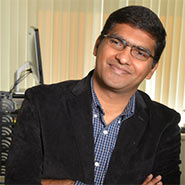IEEE SPS SAM TC Webinar: 19 May 2022, by Waheed U. Bajwa

IEEE SPS SAM TC Webinar
(Organized by the IEEE SPS Sensor Array and Multichannel Technical Committee (SAM TC))
Title: Scalable Algorithms for Distributed Principal Component Analysis
Date: 19 May 2022
Time: 10:00 AM - 11:00 AM ET (New York time)
Duration: Approximately 1 Hour
Presenters: Waheed U. Bajwa
Register for the webinar to acquire Zoom link!
About the topic:
The Principal Component Analysis (PCA) is considered to be a quintessential data preprocessing tool in many machine learning applications. But the high dimensionality and massive scale of data in several of these applications means the traditional centralized PCA solutions are fast becoming irrelevant for them. Distributed PCA, in which a multitude of interconnected computing devices collaborate among themselves in order to obtain the principal components of the data, is a typical approach to overcome the limitations of the centralized PCA solutions. The focus in this talk is on the distributed PCA problem when the data are distributed among computing devices whose interconnections correspond to an ad-hoc topology. Such setup, which corresponds to the Internet-of-Things, vehicular networks, mobile edge computing, etc., has been considered in a few recent works on distributed PCA. But the resulting solutions either overlook the uncorrelated feature learning aspect of the PCA problem, tend to have high communications overhead that makes them unscalable and/or lack 'exact' or 'global' convergence guarantees. In order to overcome these limitations, this talk introduces two closely related variants of a new and scalable distributed PCA algorithm, termed FAST-PCA (Fast and exAct diSTributed PCA), that is efficient in terms of communications because of its one time-scale nature. The proposed FAST-PCA algorithm is theoretically shown to converge linearly and exactly to the principal components, leading to dimension reduction as well as uncorrelated features for machine learning, while extensive numerical experiments on both synthetic and real data highlight its superiority over existing distributed PCA algorithms.
About the presenter:

Waheed U. Bajwa whose research interests include statistical signal processing, high-dimensional statistics, machine learning, inverse problems, and networked systems, is currently a visiting fellow in the Center for Statistics and Machine Learning at Princeton University, and an associate professor in the Department of Electrical and Computer Engineering and an associate member of the graduate faculty of the Department of Statistics at Rutgers University.
Dr. Bajwa has received several research and teaching awards including the Army Research Office Young Investigator Award (2014), the National Science Foundation CAREER Award (2015), Rutgers Presidential Merit Award (2016), Rutgers Presidential Fellowship for Teaching Excellence (2017), Rutgers Engineering Governing Council ECE Professor of the Year Award (2016, 2017, 2019), Rutgers Warren I. Susman Award for Excellence in Teaching (2021), and Rutgers Presidential Outstanding Faculty Scholar Award (2022). He is a co-investigator on a work that received the Cancer Institute of New Jersey’s Gallo Award for Scientific Excellence in 2017, a co-author on papers that received Best Student Paper Awards at IEEE IVMSP 2016 and IEEE CAMSAP 2017 workshops, and a Member of the Class of 2015 National Academy of Engineering Frontiers of Engineering Education Symposium.
For more information, please contact: Xiao Fu or Nuria Gonzalez-Prelcic

